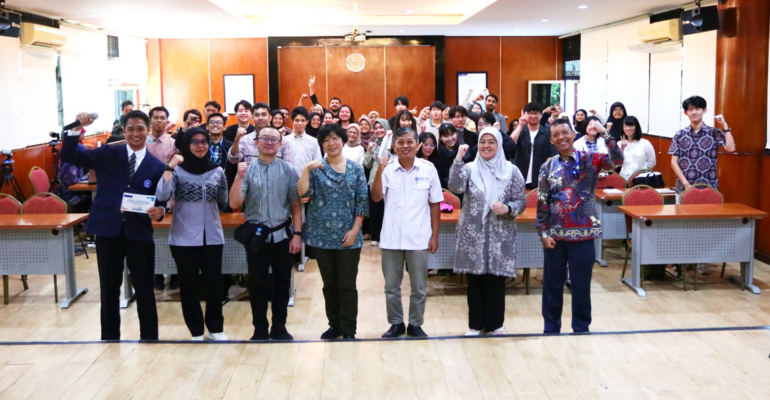IPB University Graduate School Hosts the 16th International Summer Course Program and ISCoNREM 2024

The Graduate School (SPs) of IPB University has organized the 16th International Summer Course Program on Tropical Agriculture and Environmental Management toward Regional Sustainability and the 3rd International Summer Course on Natural Resources and Environmental Management Science (ISCoNREM) 2024.
The event, held by the Master’s Program in Natural Resources and Environmental Management (PSL) of IPB University from September 8th to 16th, is a collaborative effort with partner universities such as Ibaraki University, the University of the Ryukyus, and Tokyo University of Agriculture and Technology. This program has been conducted annually since 2006.
Participants come from various universities, including Ibaraki University, the University of the Ryukyus, the University of Tsukuba, Seoul National University, Tsuda University, Iwate University, Universitas Indonesia, Telkom University, and IPB University. These students hail from multiple countries such as Indonesia, Japan, Pakistan, South Korea, Tanzania, Uganda, Zimbabwe, Afghanistan, China, and France.
In his opening remarks, Prof Ernan Rustiadi, Vice Rector of IPB University for Research, Innovation, and Agromaritime Development, emphasized that sustainable environmental management is closely tied to other aspects of land-use management, including the sustainability of agriculture.
“Therefore, environmental management and sustainable agricultural practices must be based on ecosystem conditions, local community cultures, and interdisciplinary knowledge,” he remarked.
He also extended a warm welcome to the participants of the summer course. “We hope you enjoy the natural beauty of Indonesia through the field trips. We believe that this international atmosphere will provide new insights and foster cultural and educational exchange on a global scale,” he added.
Prof Dodik Ridho Nurrochmat, Dean of the Graduate School at IPB University, noted that the summer course program has been an annual event organized by the Graduate School. “We are grateful to all the universities in the consortium for trusting the Graduate School of IPB University to host this year’s summer course,” he said.
He explained that the goal of this program is to deepen understanding of regional sustainability through multifaceted research that covers disaster prevention, agricultural resilience, ecosystems amidst disasters, and the impacts of social and technological disruptions. Throughout the program, students will engage in lectures, presentations, field practices, technical visits, and dynamic group discussions.
“This program is carefully designed to encourage participants to think critically, challenge assumptions, and collaborate creatively. Furthermore, group discussions will focus on issues related to disaster prevention, agricultural and ecosystem resilience, and their connection to regional sustainability,” he elaborated.
Also present at the summer course was Dr Syarifah Sofiah, Secretary of Bogor City. In her presentation, she discussed the theme “Harmonization of Rural-Urban Sustainable Environmental and Agricultural Development in Bogor City.”
Dr Syarifah explained that Bogor City currently has innovative strategies to harmonize development, protect ecosystems, and ensure the well-being of its people. She also emphasized the importance of integrating sustainable agriculture, smart urban planning, and environmental conservation in ways that benefit both rural and urban areas.
“This harmonization is not merely a goal but an ongoing process that requires cooperation from all stakeholders—government, communities, businesses, and individuals. We are confident that together we can build a sustainable, resilient, and inclusive future while ensuring that Bogor’s green landscapes and agricultural heritage thrive alongside urban growth,” she added. (HBL/Rz) (IAAS/RUM)


